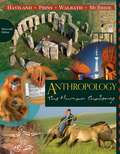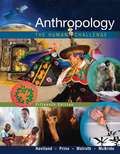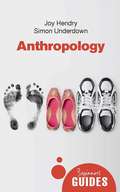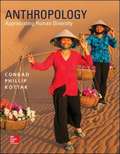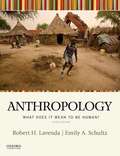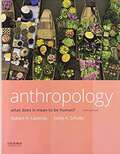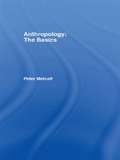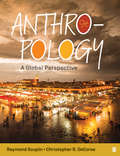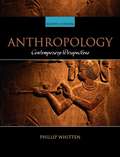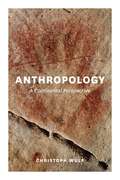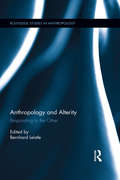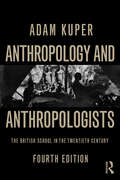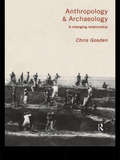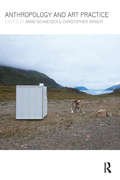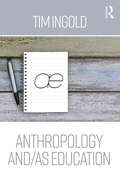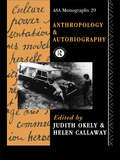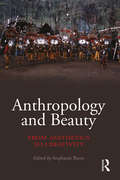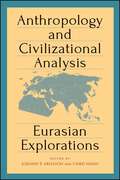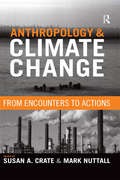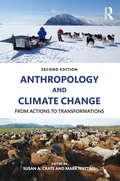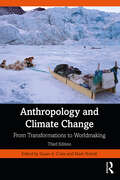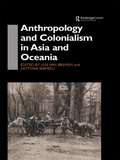- Table View
- List View
Anthropology: The Human Challenge
by William A. Haviland Harald E. L. Prins Dana Walrath Bunny McbrideThis book offers a comprehensive and balanced presentation on views of human culture, evolution, and prehistory. The text presents the principles and processes of anthropology, both physical (biological) and cultural, including ethnology, linguistics, and prehistoric archaeology in an integrated, holistic manner. The book's framework emphasizing the challenge of human survival, the connections between biology and culture, and the impact of globalization on peoples and cultures around the world, serves to unify the material. The authors integrate contemporary research and ideas from several schools of thought, and use a lively writing style to engage readers and keep them interested in "real world" anthropology.
Anthropology: The Human Challenge
by William Haviland Dana Walrath Bunny McBride Harald PrinsWith compelling photos, engaging examples, conceptual tools, and select studies by anthropologists in far-flung places, the authors of ANTHROPOLOGY: THE HUMAN CHALLENGE, 15th Edition, provide a holistic view of anthropology to help you gain a deeper and more comprehensive understanding of our complex world. You'll discover the different ways humans face the challenge of existence, the connection between biology and culture in the shaping of human behavior, and the impact of globalization on peoples and cultures around the world.
Anthropology: A Beginner's Guide (Beginner's Guides)
by Joy Hendry Simon UnderdownThe first introductory guide to explore both biological and cultural approaches to the study of humanity, from the origin of our species, to traits that we all share, to the vast range of our sacred rites and rituals. Hendry and Underdown bring anthropology to life with case studies, explaining why witchcraft was so feared in colonial Salem but embraced in Sudan and elsewhere and what our relationship with mobile phones (and even the bathroom) tells us about ourselves. Joy Hendry is Professor of Social Anthropology at Oxford Brookes University in the UK and is author of Sharing Our Worlds: An Introduction to Social Anthropology. Simon Underdown is Senior Lecturer in Biological Anthropology also at Brookes University in Oxford.
Anthropology: Appreciating Human Diversity
by Conrad Phillip KottakA leading name in anthropology, Conrad Philip Kottak continues to define student learning in the general anthropology course. Anthropology: Appreciating Human Diversity offers an up-to-date holistic introduction to general anthropology from the four-field perspective. Key themes of appreciating the experiences students bring to the classroom, appreciating human diversity, and appreciating the field of anthropology are showcased throughout the text. Focusing on an increasingly interconnected world, the new Focus on Globalization essays examine topics as diverse as tourism in the ancient and modern worlds, global disease pandemics, world events (including the Olympics and the World Cup), and the expansion of international finance and branding. Connect is the only integrated learning system that empowers students by continuously adapting to deliver precisely what they need, when they need it, and how they need it, so that your class time is more engaging and effective.
Anthropology: What Does It Mean to Be Human?
by Robert H. Lavenda Emily A. SchultzA unique alternative to more traditional, encyclopedic introductory texts, Anthropology: What Does It Mean to Be Human?, Third Edition, takes a question-oriented approach that incorporates cutting-edge theory and new ways of looking at important contemporary issues such as power, human rights, and inequality. With a total of sixteen chapters, this engaging, full-color text is an ideal one-semester overview that delves deep into anthropology without overwhelming students.
Anthropology: What Does It Mean To Be Human?
by Robert H. Lavenda Emily A. SchultzA unique alternative to more traditional, encyclopedic introductory texts, Anthropology: What Does It Mean to Be Human?, Fifth Edition, takes a question-oriented approach that incorporates cutting-edge theory and new ways of looking at important contemporary issues such as power, human rights, and inequality. <p><p>With a total of sixteen chapters, this engaging, full-color text is an ideal one-semester overview that delves deep into anthropology without overwhelming students.
Anthropology: The Basics (The Basics)
by Peter MetcalfThe ultimate guide for the student encountering anthropology for the first time, Anthropology: The Basics explains and explores key anthropological concepts including: what is anthropology? how can we distinguish cultural differences from physical ones? what is culture, anyway? how do anthropologists study culture? what are the key theories and approaches used today? How has the discipline changed over time? This student-friendly text provides an overview of the fundamental principles of anthropology and is an invaluable guide for anyone wanting to learn more about this fascinating subject.
Anthropology: A Global Perspective
by Raymond Urban Scupin Christopher Raymond DeCorseNow with SAGE Publishing! Using state-of-the-art research, Anthropology: A Global Perspective introduces students to the four core subfields of anthropology and applied anthropology. Integrating material from each subfield, this comprehensive text is founded on four essential themes: the diversity of human societies; the similarities that tie all humans together; the interconnections between the sciences and humanities; and a new theme addressing psychological essentialism. Authors Raymond Scupin and Christopher R. DeCorse demonstrate how anthropologists use research techniques and methods to help solve practical problems and show readers how anthropology is relevant to improving human societies.
Anthropology: A Global Perspective
by Raymond Urban Scupin Christopher Raymond DeCorseNow with SAGE Publishing! Using state-of-the-art research, Anthropology: A Global Perspective introduces students to the four core subfields of anthropology and applied anthropology. Integrating material from each subfield, this comprehensive text is founded on four essential themes: the diversity of human societies; the similarities that tie all humans together; the interconnections between the sciences and humanities; and a new theme addressing psychological essentialism. Authors Raymond Scupin and Christopher R. DeCorse demonstrate how anthropologists use research techniques and methods to help solve practical problems and show readers how anthropology is relevant to improving human societies.
Anthropology: The Human Challenge
by Dana Walrath William Haviland Harald PrinsNIMAC-sourced textbook <P><P>Discover an exciting survivor of the Pleistocene and ingenious creator of the Anthropocene -- Homo sapiens. Yes, that's you! And over seven billion other members of your own species currently dispersed across the entire earth (and a few even in space). With compelling photos, engaging examples, conceptual tools, and select studies by anthropologists in far-flung places, the authors of ANTHROPOLOGY: THE HUMAN CHALLENGE, 15th Edition, provide a holistic view of anthropology to help you gain a deeper and more comprehensive understanding of our complex world. You'll discover the different ways humans face the challenge of existence, the connection between biology and culture in the shaping of human behavior, and the impact of globalization on peoples and cultures around the world.
Anthropology: Contemporary Perspectives
by Phillip WhittenThis collection of short readings on all aspects of anthropology conveys the excitement and relevance of contemporary anthropology. This book organizes readings around the major subdisciplines within anthropology: biological anthropology, cultural anthropology, archaeology, and language and communication, making it easy to notice trends and themes. For anyone with an interest in anthropology.
Anthropology: A Continental Perspective
by Christoph WulfOriginally published in German, Christoph Wulf’s Anthropology sets its sights on a topic as ambitious as its title suggests: anthropology itself. Arguing for an interdisciplinary and intercultural approach to anthropology that incorporates science, philosophy, history, and many other disciplines, Wulf examines—with breathtaking scope—all the ways that anthropology has been understood and practiced around the globe and through the years. Seeking a central way to understand anthropology in the midst of many different approaches to the discipline, Wulf concentrates on the human body. An emblem of society, culture, and time, the body is also the result of many mimetic processes—the active acquisition of cultural knowledge. By examining the role of the body in the performance of rituals, gestures, language, and other forms of imagination, he offers a bold new look at how culture is produced, handed down, and transformed. Drawing such examinations into a comprehensive and sophisticated assessment of the discipline as a whole, Anthropology looks squarely at the mystery of humankind and the ways we have attempted to understand it.
Anthropology and Activism: New Contexts, New Conversations
by Anna J. WillowThis book offers a comprehensive and current look at the complex relationship between anthropology and activism. Activism has become a vibrant research topic within anthropology. Many scholars now embrace their own roles as engaged social actors, which has compelled reflexive attention to the anthropology/activism intersection and its implications. With contributions by emerging scholars as well as leading activist anthropologists, this volume illuminates the diverse ways in which the anthropology/activism relationship is being navigated. Chapters touch on key areas including environment and extraction, food sustainability and security, migration and human rights, health disparities and healthcare access, class and gender identities and empowerment, and the defense of democracy. Case studies (drawn mainly from North America) encourage readers to think through their own experiences and expectations and will serve as durable documentation of how movements develop and change. This timely survey of the activist anthropological landscape is valuable reading in an era of widely perceived ecological and political crisis, where disinterested data collection increasingly appears to be a luxury that neither the discipline nor the world can afford.
Anthropology and Alterity: Responding to the Other (Routledge Studies in Anthropology)
by Bernhard LeistleAlterity or otherness is a central notion in cultural anthropology and philosophy, as well as in other disciplines. While anthropology, with its aim of understanding cultural difference, tends to take otherness as a fact, there have been vigorous attempts in contemporary philosophy, particularly in phenomenology, to answer the fundamental question: What is the Other? This book brings the two approaches to otherness – the hermeneutical pragmatics of anthropology, and the radical reflection of philosophy – together, with the goal of enriching one through the other. The philosophy of the German phenomenologist Bernhard Waldenfels, up to now little known to anthropologists, has a central position in this undertaking. Waldenfels’s concept of a responsivity to the Other offers to cultural anthropology the possibility of a philosophical engagement with the Other that does not contradict the project of making sense of concrete empirical others. The book illustrates the fertility of this new approach to alterity through a broad spectrum of themes, ranging from reflections on theory formation, via discussions of race and human-animal relations, to personal meditations on experiences of alterity.
Anthropology and Anthropologists: The British School in the Twentieth Century
by Adam KuperAnthropology and Anthropologists provides an entertaining and provocative account of British social anthropology from the foundations of the discipline, through the glory years of the mid-twentieth century and on to the transformation in recent decades. The book shocked the anthropological establishment on first publication in 1973 but soon established itself as one of the introductions for students of anthropology. Forty years later, this now classic work has been radically revised. Adam Kuper situates the leading actors in their historical and institutional context, probes their rivalries, revisits their debates, and reviews their key ethnographies. Drawing on recent scholarship he shows how the discipline was shaped by the colonial setting and by developments in the social sciences.
Anthropology and Archaeology: A Changing Relationship
by Chris GosdenAnthropolgy and Archaeology provides a valuable and much-needed introduction to the theories and methods of these two inter-related subjects. This volume covers the historical relationship and contemporary interests of archaeology and anthropology. It takes a broad historical approach, setting the early history of the disciplines with the colonial period during which the Europeans encountered and attempted to make sense of many other peoples. It shows how the subjects are linked through their interest in kinship, economics and symbolism, and discusses what each contribute to debates about gender, material culture and globalism in the post-colonial world.
Anthropology and Art Practice: Contemporary Ethnographic Practice (Contemporary Ethnographic Practice Ser.)
by Christopher Wright Arnd SchneiderAnthropology and Art Practice takes an innovative look at new experimental work informed by the newly-reconfigured relationship between the arts and anthropology. This practice-based and visual work can be characterised as 'art-ethnography'. In engaging with the concerns of both fields, this cutting-edge study tackles current issues such as the role of the artist in collaborative work, and the political uses of documentary. The book focuses on key works from artists and anthropologists that engage with 'art-ethnography' and investigates the processes and strategies behind their creation and exhibition.The book highlights the work of a new generation of practitioners in this hybrid field, such as Anthony Luvera, Kathryn Ramey, Brad Butler and Karen Mizra, Kate Hennessy and Jennifer Deger, who work in a diverse range of media - including film, photography, sound and performance. Anthropology and Art Practice suggests a series of radical challenges to assumptions made on both sides of the art/anthropology divide and is intended to inspire further dialogue and provide essential reading for a wide range of students and practitioners.
Anthropology and/as Education: Anthropology, Art, Architecture And Design
by Tim IngoldThere is more to education than teaching and learning, and more to anthropology than making studies of other people’s lives. Here Tim Ingold argues that both anthropology and education are ways of studying, and of leading life, with others. In this provocative book, he goes beyond an exploration of the interface between the disciplines of anthropology and education to claim their fundamental equivalence. Taking inspiration from the writings of John Dewey, Ingold presents his argument in four close-knit chapters. Education, he contends, is not the transmission of authorised knowledge from one generation to the next but a way of attending to things, opening up paths of growth and discovery. What does this mean for the ways we think about study and the school, teaching and learning, and the freedoms they exemplify? And how does it bear on the practices of participation and observation, on ways of study in the field and in the school, on art and science, research and teaching, and the university? Written in an engaging and accessible style, this book is intended as much for educationalists as for anthropologists. It will appeal to all who are seeking alternatives to mainstream agendas in social and educational policy, including educators and students in philosophy, the social sciences, educational psychology, environmentalism and arts practice.
Anthropology and Autobiography
by Judith Okely Helen CallawayAnthropological writings by anthropologists in the field have long been a valuable tool to the profession. But until now, the theoretical implications of its use have not been fully explored. Anthropology and Autobiography provides unique insights into the fieldwork, autobiographical materials and/or textual critiques of anthropologists, many of whose ethnographies are already familiar. It considers the role of the anthropologist as fieldworker and writer, examining the ways in which nationality, age, gender, and personal history influence the anthropologist's behavior towards the individuals he is observing. This volume also contributes to debates about reflexivity and the political responsibility of the anthropologist, who, as a participant, has traditionally made only stylized appearances in the academic text. The contributors examine their work among peoples in Africa, Japan, the Caribbean, Greece, Shetland, England, indigenous Australia, Indonesia, and Sri Lanka. Autobiography is developed alongside political, intellectual, and historical changes. The anthropologists confront and examine issues of racism, reciprocity and friendships. Anthropology and Autobiography will appeal to anthropologists and social scientists interested in ethnographic approaches, the self, reflexivity, qualitative methodology, and the production of texts.
Anthropology and Beauty: From Aesthetics to Creativity
by Stephanie BunnOrganised around the theme of beauty, this innovative collection offers insight into the development of anthropological thinking on art, aesthetics and creativity in recent years. The volume incorporates current work on perception and generative processes, and seeks to move beyond a purely aesthetic and relativist stance. The chapters invite readers to consider how people sense and seek out beauty, whether through acts of human creativity and production; through sensory experience of sound, light or touch, or experiencing architecture; visiting heritage sites or ancient buildings; experiencing the environment through ‘places of outstanding natural beauty’; or through cooperative action, machine-engineering or designing for the future.
Anthropology and Civilizational Analysis: Eurasian Explorations (SUNY series, Pangaea II: Global/Local Studies)
by Johann P. Arnason; Chris HannThe concept of civilization has a long but checkered history in anthropology, and anthropological materials have been of great importance for the development of civilizational analysis in historical sociology. Anthropology and Civilizational Analysis brings these diverse fields together and explores a wide range of topics pertaining to civilization, from classical theories to contemporary rhetorical discourses, including detailed case studies of concrete practices documented through archival and ethnographic research. While many scholars and the wider public still think of civilization in simplistic terms, viewing it in terms of Enlightenment notions of progress and evolution to higher stages, others have pluralized the term only to create essentialized units which are only tenuously linked to historical processes. In this book contributors use dynamic approaches, including those rooted in the seminal writings of Émile Durkheim and Marcel Mauss, opening up the dimension of civilization as an important complement to other key terms such as society and culture in social science and historical analysis.
Anthropology and Climate Change: From Encounters to Actions
by Susan A. Crate Mark NuttallThe first book to comprehensively assess anthropology’s engagement with climate change, this pioneering volume both maps out exciting trajectories for research and issues a call to action. Chapters in part one are systematic research reviews, covering the relationship between culture and climate from prehistoric times to the present; changing anthropological discourse on climate and environment; the diversity of environmental and sociocultural changes currently occurring around the globe; and the unique methodological and epistemological tools anthropologists bring to bear on climate research. Part two includes a series of case studies that highlights leading-edge research—including some unexpected and provocative findings. Part three challenges scholars to be proactive on the front lines of climate change, providing instruction on how to work in with research communities, with innovative forms of communication, in higher education, in policy environments, as individuals, and in other critical arenas. Linking sophisticated knowledge to effective actions, Anthropology and Climate Change is essential for students and scholars in anthropology and environmental studies.
Anthropology and Climate Change: From Actions to Transformations
by Susan A. Crate Mark NuttallThe first edition of Anthropology and Climate Change (2009) pioneered the study of climate change through the lens of anthropology, covering the relation between human cultures and the environment from prehistoric times to the present. This second, heavily revised edition brings the material on this rapidly changing field completely up to date, with major scholars from around the world mapping out trajectories of research and issuing specific calls for action. The new edition introduces new “foundational” chapters—laying out what anthropologists know about climate change today, new theoretical and practical perspectives, insights gleaned from sociology, and international efforts to study and curb climate change—making the volume a perfect introductory textbook; presents a series of case studies—both new case studies and old ones updated and viewed with fresh eyes—with the specific purpose of assessing climate trends; provides a close look at how climate change is affecting livelihoods, especially in the context of economic globalization and the migration of youth from rural to urban areas; expands coverage to England, the Amazon, the Marshall Islands, Tanzania, and Ethiopia; re-examines the conclusions and recommendations of the first volume, refining our knowledge of what we do and do not know about climate change and what we can do to adapt.
Anthropology and Climate Change: From Transformations to Worldmaking
by Susan A. Crate Mark NuttallIn this third edition of Anthropology and Climate Change, Susan Crate and Mark Nuttall offer a collection of chapters that examine how anthropologists work on climate change issues with their collaborators, both in academic research and practicing contexts, and discuss new developments in contributions to policy and adaptation at different scales. Building on the first edition’s pioneering focus on anthropology’s burgeoning contribution to climate change research, policy, and action, as well as the second edition’s focus on transformations and new directions for anthropological work on climate change, this new edition reveals the extent to which anthropologists’ contributions are considered to be critical by climate scientists, policymakers, affected communities, and other rights-holders. Drawing on a range of ethnographic and policy issues, this book highlights the work of anthropologists in the full range of contexts – as scholars, educators, and practitioners from academic institutions to government bodies, international science agencies and foundations, working in interdisciplinary research teams and with community research partners. The contributions to this new edition showcase important new academic research, as well as applied and practicing approaches. They emphasize human agency in the archaeological record, the rapid development in the last decade of community-based and community-driven research and disaster research; provide rich ethnographic insight into worldmaking practices, interventions, and collaborations; and discuss how, and in what ways, anthropologists work in policy areas and engage with regional and global assessments. This new edition is essential for established scholars and for students in anthropology and a range of other disciplines, including environmental studies, as well as for practitioners who engage with anthropological studies of climate change in their work.
Anthropology and Colonialism in Asia: Comparative and Historical Colonialism (Anthropology of Asia)
by Jan van Bremen Akitoshi ShimizuFor a time it was almost a cliche to say that anthropology was a handmaiden of colonialism - by which was usually meant 'Western' colonialism. And this insinuation was assumed to somehow weaken the theoretical claims of anthropology and its fieldwork achievements.What this collection demonstrates is that colonialism was not only a Western phenomenon, but 'Eastern' as well. And that Japanese or Chinese anthropologists were also engaged in studying subject peoples.But wherever they were and whoever they were anthropologists always had a complex and problematic relationship with the colonial state. The latter saw some anthropologists' sympathy for 'the natives' as a threat, while on the other hand anthropological knowledge was used for the training of colonial officials.The impact of the colonial situation on the formation of anthropological theories is an important if not easily answered question, and the comparison of experiences in Asia offered in this book further helps to illuminate this complex relationship.
